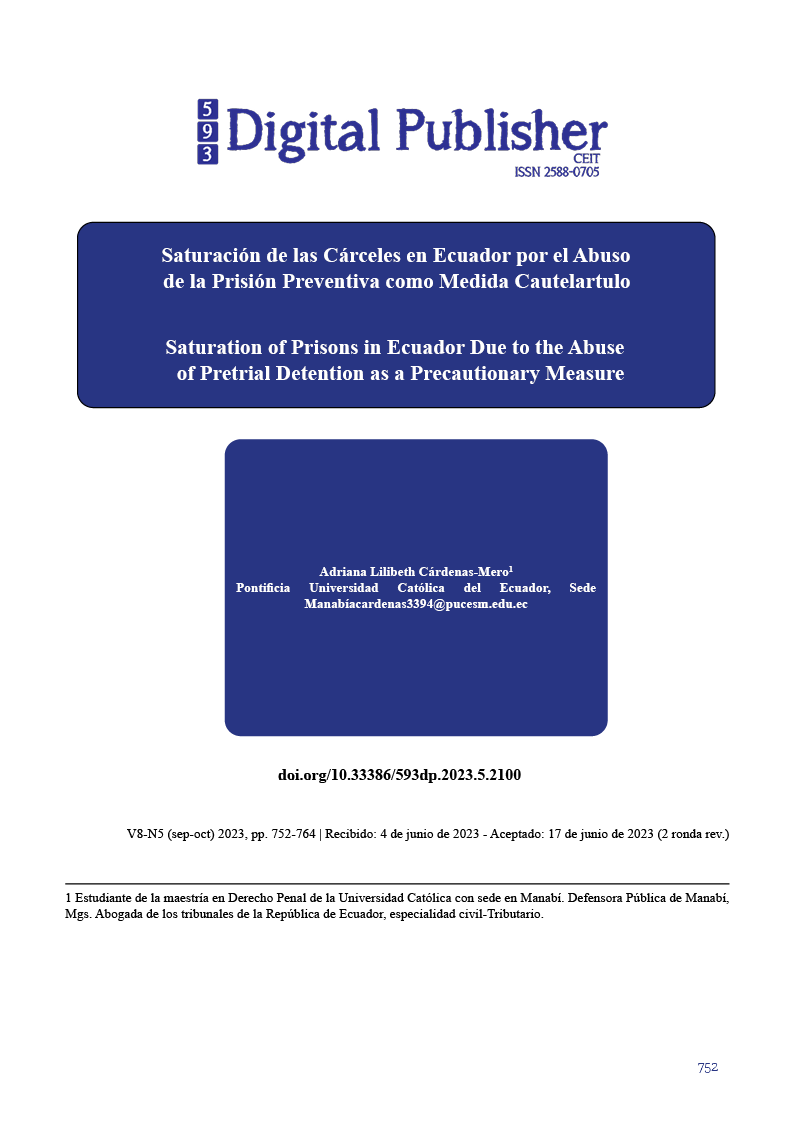Saturation of Prisons in Ecuador Due to the Abuse of Pretrial Detention as a Precautionary Measure
Main Article Content
Abstract
The legal problem that arises in this case is the saturation of prisons in Ecuador due to the abuse of preventive detention as a precautionary measure, which restricts the ambulatory freedom of citizens to defend themselves in freedom when they are immersed in criminal proceedings, due to the inopportune and illegal application of the same by the judges and prosecutors of the country. It is important to examine how the lack of clear criteria and objectives in the use of this measure has affected prison overcrowding (the number of people incarcerated) and has led to people being held in prison for prolonged periods without trial, leading to overcrowding in prisons and a violation of due process and the human rights of persons deprived of liberty. It will delve into the legal basis on which judges and prosecutors rely for the application of pretrial detention and how this has become a common norm in the Ecuadorian penal system. It will examine the existing policies, practices and legislation that have allowed the proliferation of pretrial detention in the country, as well as the negative impact it has had on the human rights of detainees. Therefore, the legal problem to be delimited focuses on the need to establish more specific and rigorous criteria in the application of pretrial detention in the Ecuadorian judicial system in order to avoid prison overcrowding and guarantee a fair and equitable process for all those involved, proposals for solutions will be analyzed from the legal and constitutional framework, so that the judge does not have the discretion he currently has to decree the precautionary measure.
Downloads
Article Details

This work is licensed under a Creative Commons Attribution-NonCommercial-ShareAlike 4.0 International License.
1. Derechos de autor
Las obras que se publican en 593 Digital Publisher CEIT están sujetas a los siguientes términos:
1.1. 593 Digital Publisher CEIT, conserva los derechos patrimoniales (copyright) de las obras publicadas, favorece y permite la reutilización de las mismas bajo la licencia Licencia Creative Commons 4.0 de Reconocimiento-NoComercial-CompartirIgual 4.0, por lo cual se pueden copiar, usar, difundir, transmitir y exponer públicamente, siempre que:
1.1.a. Se cite la autoría y fuente original de su publicación (revista, editorial, URL).
1.1.b. No se usen para fines comerciales u onerosos.
1.1.c. Se mencione la existencia y especificaciones de esta licencia de uso.
References
Caso Chaparro Álvarez y Lapo Íñiguez vs. Ecuador (Corte Interamericana de Derechos Humanos 21 de noviembre de 2007).
CIDH. (s.f.). Extralimitación del poder punitivo de jueces y fiscales en el decreto de prisión preventiva sin sustento legal, Kuffó-Guillén, L. & Gende-Ruperti. Obtenido de Comisión Interamericana de Derechos: Digital Publisher https://doi.org/10.33386/593dp.2022.1-1.1039
Convención Americana Sobre Derechos Humanos. (1969, 22 de noviembre). suscrita En La Conferencia Especializada Interamericana Sobre Derechos Humano.
Diario expreso.ec. (12 de octubre de 2021). expreso.ec. Obtenido de https://www.expreso.ec/actualidad/politica/pedidos-prision-preventiva-superan-numero-presos-113568.html
Figueroa M. & Jame C. (2021). FACTORES DETERMINANTES QUE IMPOSIBILITAN. Obtenido de Universidad de Guayaquil, Guayaquil.: http://repositorio.ug.edu.ec/bitstream/redug/58128/1/BDER-TPrG%20255-
H, C. I. (21 de noviembre de 2007). Caso Chaparro Álvarez y Lapo Íñiguez vs. Ecuador. San José de Costa Rica.
Humanos, C. I. (12 de noviembre de 1997). Caso Suárez Rosero Vs. Ecuador . Corte en San José, Costa Rica,
Humanos, C. I. (23 de septiembre de 2016). Case Vasquez Durand vs. Ecuador . Washington DC.
HUMANOS, C. I. (s.f.). CASO CIDH VS. ECUADOR. San José, Costa Rica: https://www.corteidh.or.cr/CF/jurisprudencia2/ficha_tecnica. Obtenido de Corte Interamericana de Derechos Humanos: https://www.corteidh.or.cr/CF/jurisprudencia2/ficha_tecnica
Krauth, S. (2018). La prisión preventiva en Ecuador. En Defensoría Pública del Ecuador, serie justicia y defensa 8 (pág. 21). Quito, Ecuador 2018.
LLERENA, M. E. (2021). ANÁLISIS SOBRE LA APLICACIÓN DE LA MEDIDA. Obtenido de UNIVERSIDAD CATÓLICA DE CUENCA: https://dspace.ucacue.edu.ec/bitstream/ucacue/9979/1/GOMEZ%20MANUEL.pdf
M.P.M, V. (2019). Alcance de las medidas cautelares personales en la reforma penal ecuatoriana. Frónesis, 26(3), 84-103. Obtenido de Recuperado a partir de https://produccioncientificaluz.org/index.php/fronesis/article/view/35237.
nacional, A. (2008). Constitución de la Republica del Ecuador. Montecristi.
Nacional, A. (2014). código Orgánico Integral Penal . Quito: Editora Nacional.
PRIMICIAS. (OCTUBRE de 2021). PRIMICIAS. Obtenido de PRIMICIAS: https://www.primicias.ec/noticias/en-exclusiva/hacinamiento-carcelario-reduccion-ecuador/
Velásquez, S. (2012). Repositorio Universidad de Coruña. Obtenido de Uruc: http://hdl.handle.net/2183/9182


